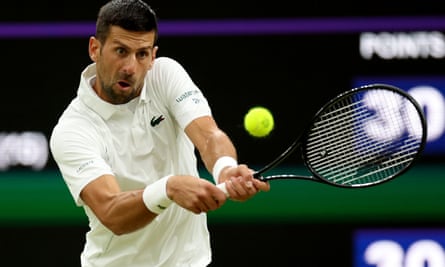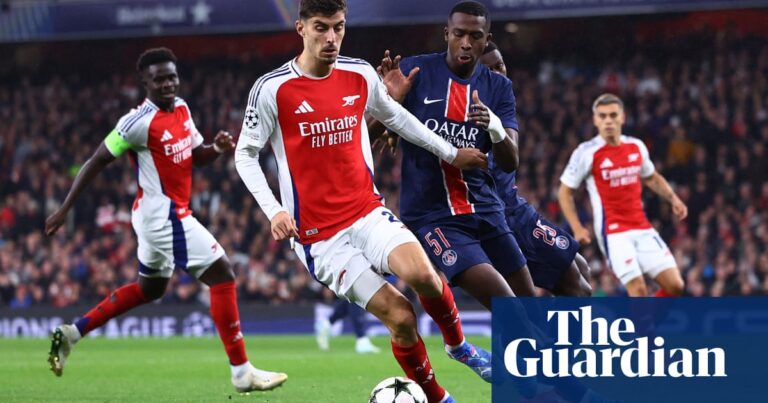When Novak Djokovic stepped up to the microphone to dissect his performance after his brilliant fourth-round victory over Holger Rune at Wimbledon, it became clear that he had a few things to get off his chest. While the on-court interviewer may have wanted to keep the vibes light and positive on Centre Court, Djokovic was determined to make his disapproval of certain parts of the audience clear. After heaping praise on the many “respectful” fans present, he did not mince his words towards those who had been zealously chanting throughout the match.
“I don’t accept it,” he said. “No. I know they were cheering for Rune but that’s an excuse to also boo. Listen, I’ve been on the tour for more than 20 years, so trust me, I know all the tricks. I know how it works. It’s fine, it’s OK.”
Over the course of his long, storied career, hostile crowds have become a regular feature in the Serb’s matches, sometimes even a second opponent. He has been heckled and insulted, he has had to find the strength to win when entire audiences are cheering against him and for his opponents. Despite his on-court brilliance, he has faced more negativity than his other legendary peers as he upheaved what had initially seemed to be a two-way race for greatness, eventually forcing Roger Federer and Rafael Nadal to both see him as equal.
This week, though, the cheers from the Centre Court crowd were tame. At the US Open in 2021, Djokovic faced an 18-year-old Rune in the first round. As the match endured and became increasingly competitive, spectators committed to bassy, elongated chants of “Ruuuuuune”, which eventually encircled the Arthur Ashe Stadium. Monday’s audience at Wimbledon drew from that same energy as the cheers became increasingly loud and they were usually followed by laughter.
In a one-sided match that was moving to a very predictable ending, the crowd seemed to be intent on having a laugh. It can sound irritating, and some fans surely were rooting for Rune in order to root against his opponent, but that is the nature of sport. They still provided a better soundtrack for the match than the many Wimbledon audiences that have lost interest in the tennis on court, instead focusing their attention on popping champagne corks and chatting during points.
Four years ago, Michael Jordan memes spread across the internet after his contributions to The Last Dance documentary primarily amounted to how personally he took so many comments and opinions that were not even meant as a slight to him; he would constantly use all of the positive things said about teammates and fans as fuel to prove how much better he was than all of them.
Djokovic’s reaction to these chants is, perhaps, another interesting insight into the mind of a champion who has mastered winning in so many different circumstances, regardless of whether he and his player box are the only people in the audience that actually want him to win. During his career, Djokovic has mastered using these instances as extra motivation to crush the opponent across the net. Back at Wimbledon in 2019, after recovering from match points down in the final to defeat Federer in front of a hostile London crowd, Djokovic famously outlined one way he can draw from the energy of those crowds.

“I like to transmutate it in a way: When the crowd is chanting ‘Roger’ I hear ‘Novak’ [smiling]. It sounds silly, but it is like that. I try to convince myself that it’s like that,” Djokovic said.
Crowd behaviour at tennis events has been topical in recent months, particularly at the French Open where David Goffin said a fan spat gum at him and he faced a shower of insults all because he was facing a French opponent in Paris, Giovanni Mpetshi Perricard, one of a number of issues that led the French Open organisers imposing an alcohol ban on fans in the stadium. A few days later, Iga Swiatek used much of her on-court interview after her remarkable comeback win over Naomi Osaka to criticise fans who had called out during points.
There are undoubtedly lines that are not to be crossed, and many instances where audiences verbally abuse or deliberately distract players. But spectators interacting and enjoying themselves at a sporting event can only be a positive thing.
Source: theguardian.com



















